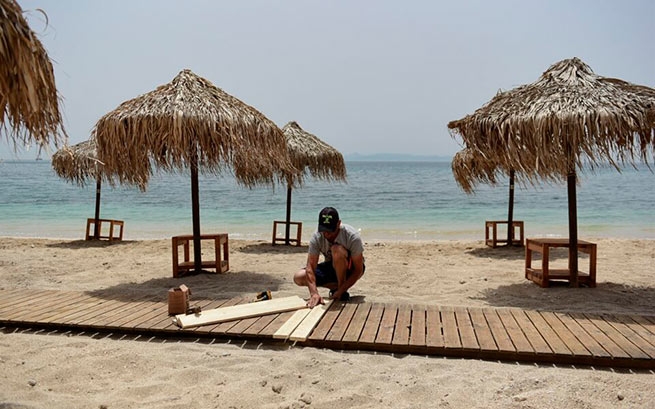The Prosecutor’s Office of the Supreme Court (Greece’s highest administrative court) has urged prosecutors across the country to prioritize maintaining unhindered access to beaches.
As noted in the circular sent to the prosecutors, there are no private beaches in Greece, and it is their duty to stop the actions of those who, through their business or other presence, can restrict the free access of citizens to the beaches. This question is called burning.
The circular was sent out the day before yesterday by the Deputy Prosecutor of the Supreme Court, Panagiotis Panagiotopoulos, who is responsible for overseeing and coordinating the work of the country’s prosecutors in matters of environmental protection and public property. As Mr. Panagiotopoulos recalls, back in 1940, legislation gave priority to the protection of the seashore as “common property”, “not being able to foresee the difficulties that will befall the embankments and beaches in the coming years.”
The preservation of the seashore and the beach is our duty, says Panagiotopoulos. “With our prosecutor’s fist, we must make it obvious, even with the help of sanctions and acts of procedural coercion, that the main goal of public property is free and unhindered access to it by the population.”
The deputy prosecutor of the Supreme Court urges prosecutors across the country to be especially strict in cases of “appropriation” of beaches by businesses or individuals. “The law does not recognize private beaches! And if, illegal and socially immoral, in the areas of your jurisdiction there are such, due to many years of complete indifference of the authorities and the absence of any control, then we must return the case to the previous legal situation with our prosecutorial actions! Not by themselves, of course, but with the assistance of all involved structures (…). However, even if the violator does not voluntarily obey the law, he is forced to do so by procedural coercion measures (detention for obvious criminal offenses and misdemeanors, confiscation at your order of all things and objects related to the crime, immediate demolition of illegal buildings, etc. and etc.), says the circular. “It is absolutely necessary, by our official conduct, to declare in all directions that we do not allow the purpose of common things to be violated, and to constantly check whether there is no concession in the use of these parts for the implementation of activities prescribed by law and which serve the bathers or the recreation of the public.”
The circular is intended to encourage prosecutors to intervene in favor of free access to the sea coast, while from all regions of Greece, complaints are increasingly (in recent years) either against hotels that enclose beaches with their facilities, thereby hindering free access, or beach bars and other similar businesses that illegally occupy almost all beaches, or through their employees, “obstruct” or even intimidate citizens who do not want to pay for their services.
Many cases have been reported in recent years, especially in tourist areas with large hotel complexes (eg Crete, Rhodes, Halkidiki, Skiathos) or in areas with strong local tourism business (eg Ios, Mykonos, Ilia).
Free access to the seashore and the beach is protected by the constitution, and the rules for the use of the seashore are set out in Law no. 2971/2001, which remains in force despite the systematic efforts of governments over the past decade to limit it.
However, in recent years, “loopholes” have appeared in the legislation that directly affect the right of free access to the beach – for example, direct rent by successive beach enterprises of the entire beach in front of them creates continuous “fronts” of umbrella stands that do not obey the 50/50 rule (free area to rented). Thus, in tourist areas, the occupation of entire beaches, and even … by law, is a frequent occurrence.
PS It would be nice if this order of the Supreme Court did not remain, as in previous years, an ordinary bureaucratic paper that is not mandatory for execution. Moreover, thousands of private beaches exist and flourish in the country.







More Stories
Where will Greece's political leaders spend the Easter holidays?
S.Kasselakis: "Citizens' deep distrust of government"
Türkiye: a lesson about the “Blue Homeland” is being introduced in the educational program